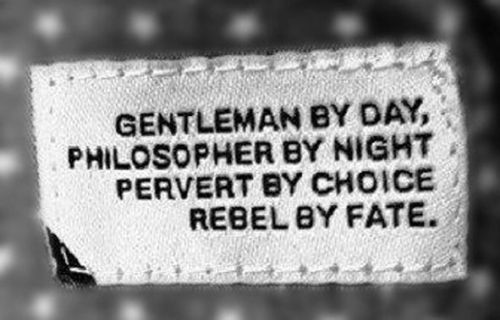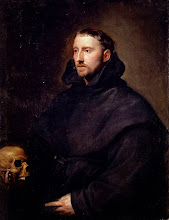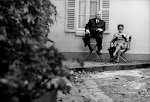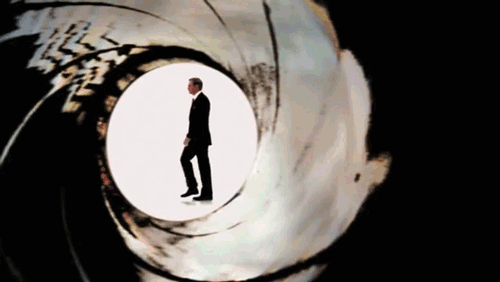Friday, October 29, 2010
Ministry of Fear (1944)

Ministry of Fear is a 1944 film noir directed by Fritz Lang based on the novel The Ministry of Fear by Graham Greene. The film tells the story of a man just released from a mental asylum who finds himself caught up in an international spy ring in London during the Blitz. After guessing the weight of a cake at a fair, he is pursued by foreign agents and incriminated for murder. The original music for the film was composed by Miklós Rózsa and Victor Young.
Fritz Lang's adaptation of Graham Greene's novel is filled with unusual touches, beginning with the fact that protagonist Stephen Neale (Ray Milland) has just been released from a mental asylum. To celebrate his return to the real world, he visits a local carnival, only to accidentally receive a "prize" meant for a Nazi agent. When he discovers the error, he turns for help to a detective, whose investigations only make the matter more complicated. Neale soon winds up on the run from both the Nazis and the police, who mistakenly believe him guilty of murder. Lang's famous expressionistic style is somewhat muted here, but Henry Sharp's crisp black-and-white cinematography sets a suitably unsettling mood, and the twists and double-crosses of Greene's story unfold at an appropriately quick pace. While it does not reach the same level of timeless classic as Carol Reed's adaptation of Greene's The Third Man four years later, Ministry of Fear stands as a well-made, thoroughly gripping and intelligent example of film noir.

Lang creates a lingering sense of dread throughout, as Neale moves alone through the foggy, bombed-out streets of London, uncovering a secret enemy network hidden beneath the veneer of respectable society. He can’t approach the police, because of his criminal record, and everyone he meets is a potential enemy - even the beautiful and resourceful Carla Hilfe (Marjorie Reynolds), who becomes his chief ally.
Wednesday, October 27, 2010
The Empire Strikes Back 30° Anniversary part4

An exclusive behind-the-scenes look at the making of arguably the greatest and most cherished of all the Star Wars films, the most important motion picture sequel of all-time, and a movie that changed pop culture forever: Star Wars: Episode V - The Empire Strikes Back. J.W. Rinzler, author of the acclaimed The Making of Star Wars, once again uses his unprecedented access to the Lucasfilm archives, and their treasure trove of never-before-published photos, design sketches, paintings, production notes, interviews, anecdotes, and scripts, to take us back thirty years to relive the entire production process for one of the most anticipated movies ever produced - along the way unveiling stories as entertaining, enthralling and mind-boggling as the film itself. As a long-standing member of the Lucasfilm staff, J.W. Rinzler has enjoyed unparalleled co-operation and support from the original moviemakers, including both George Lucas and veteran director Irvin Kershner. The result is a truly definitive account that is destined to become a must-have for all true Star Wars fans and serious cinephiles. Jonathan Rinzler is a New York Times bestselling author and longtime editor at Lucasfilm Publishing.
Sunday, October 17, 2010
Death on the Nile (1978)

Death on the Nile is a 1978 film based on the Agatha Christie mystery novel of the same title, directed by John Guillermin. The film features the Belgian detective Hercule Poirot played by Peter Ustinov plus an all-star cast. It takes place in Egypt, mostly on the Nile River. Many of the cultural highlights of Egypt are also featured in the film, such as the Great Pyramids, the Sphinx, and temples at Abu Simbel and Karnak.
The film shot seven weeks on location in Egypt, four on the steamer Karnak and the rest at places such as Aswan, Abu Simbel, Luxor, and Cairo. Desert filming required makeup call at 4 a.m. and shooting at 6 a.m. to accommodate a two-hour delay around noon when temperatures hovered near 130 degrees. Bette Davis wryly commented, "In the older days, they'd have built the Nile for you. Nowadays, films have become travelogues and actors stuntmen."
During the shoot, troubles arose as no hotel reservations had been made for the crew. They were subsequently shifted from hotel to hotel, sometimes on a daily basis. Director Guillermin was never allowed to see the rushes. On order of the producers, footage was sent directly to the producers in London. A lighter moment occurred during a love scene between Chiles and MacCorkindale, when a hostile desert fly landed on Chiles's teeth. The actors carried on as best they could, but the crew burst out laughing when Guillermin thankfully called "cut" and ordered another take.
Costume designer Anthony Powell paid impressive attention to detail, eventually winning an Oscar for Best Costume design. Among his touches were shoes for Chiles that featured diamond studded heels that came from a millionaire's collection and shoes worn by Davis made from the scales of twenty-six pythons.
In order to tie in with 1974's successful adaption of Murder on the Orient Express, the film was initially titled Murder on the Nile before it reverted to the novel's original title. Artist Richard Amsel was commissioned to redesign the poster art from an image of the Karnak steamer to an image suggesting King Tutankhamun with ceremonial knife (and modern revolver), surrounded by the cast, which again recalled the earlier film.


The film begins with a meeting between wealthy heiress Linnet Ridgeway (Lois Chiles) and her close friend Jacqueline de Bellefort (Mia Farrow). Jackie wants her fiancé, Simon Doyle (Simon MacCorkindale), to work for Linnet. But he and Linnet have a whirlwind affair and end up marrying. While honeymooning in Egypt, they are continually hounded by a jilted Jackie. In an attempt to get away, the Doyles board a Nile paddle steamer, the S.S. Karnak.
When the passengers venture off-shore to examine a nearby temple, a large stone is pushed off a pillar and narrowly misses Simon and Linnet. They again encounter Jackie, who boards the ship and ignores the warnings of detective Hercule Poirot (Peter Ustinov) to stay away, revealing that she carries a small pistol. After a late-night game of cards in the ship's lounge, Jackie confronts Simon. She shoots him in a drunken rage and hits him in the leg. The next morning, Linnet Ridgeway is discovered murdered in her cabin, shot in the head by a similar weapon, with almost everyone aboard the S.S. Karnak having had a reason to want to do away with the heiress. The pistol has meanwhile gone missing.
Linnet's jewels were coveted by elderly Mrs. van Schuyler (Bette Davis). Miss Bowers (Maggie Smith), was forced into a life of servitude when Linnet’s father destroyed her family. The maid, Louise Bourget (Jane Birkin), was upset because Linnet refused her a promised dowry. James Ferguson (Jon Finch), a communist, resented Linnet's life of luxury. Eccentric novelist Salome Otterbourne (Angela Lansbury) faced a libel suit brought by Linnet (the dead cannot be libeled). The author's daughter Rosalie (Olivia Hussey) wanted to protect her mother. American lawyer Andrew Pennington (George Kennedy) had embezzled from the Ridgeway family. Dr. Ludwig Bessner (Jack Warden) was upset because Linnet made defamatory remarks about his clinic. Jacqueline de Bellefort was upset with Linnet for obvious reasons. Poirot admits he found out all this by being a "nasty eavesdropper." Now it’s up to the Belgian sleuth, along with his vacationing friend Colonel Race (David Niven), to solve the mystery.
Jackie is a natural suspect but has a perfect alibi, having been sedated and observed by Miss Bowers all night. Simon Doyle was also unable to commit the crime due to his leg wound. Poirot is convinced someone on deck overheard the argument, removed the gun and used it to kill Linnet.
A bundle had been found in the Nile. The missing pistol is wrapped in Mrs. van Schuyler's stole, which was apparently used to muffle the sound of a gunshot and prevent scorching, as seen around Linnet's injury. A handkerchief was also included, stained with red ink, some of which was found in Linnet's pearl nail-varnish bottle.
While Poirot and Race conduct their investigation, the maid Louise is murdered. Her throat has been cut with one of Dr. Bessner's scalpels and a fragment of a banknote is found in her hand. Poirot realizes she probably saw the murderer coming out of Linnet's cabin and attempted to extort money in return for her silence. Salome Otterbourne claims to have seen Louise's murderer and is about to tell Poirot when she is shot in the head through an open cabin door with Pennington's revolver, too large to have been used on Linnet.
With several suspects eliminated, Poirot gathers everyone in the saloon, where he reveals the solution — Simon Doyle murdered his wife, with Jacqueline as his accomplice. Poirot reveals that Simon and Jackie were still lovers, and his marriage to Linnet had been cleverly plotted in order to gain her money. They faked Simon's shooting, leaving him free to murder Linnet while the doctor was being fetched by Ferguson and as Jacqueline was attended to by Miss Bowers. Simon was left alone long enough to run to Linnet's room, shoot her in the head, return to the lounge and shoot himself in the leg through the stole - a third shot of which no one was aware. Jackie covered up. She stole the knife and revolver, then killed the maid and Salome Otterbourne, who were witnesses to the murders. Simon and Jackie point out that Poirot has no proof, so Poirot convinces Simon that his hands could be tested for grains of gunpowder removed with wax. When they realize that they have been found out, they confess, and in a final love embrace, Jackie covertly takes back her pistol and shoots Simon, then herself.
Later Poirot says goodbye to the remaining guests, reveals that the test was made-up, and Rosalie and Ferguson announce that they are engaged
Saturday, October 16, 2010
In Memoriam : Simon MacCorkindale (1952-2010)

British actor Simon MacCorkindale has lost his fight against cancer at the age of 58 at a London clinic on Thursday night with his wife, actress Susan George, by his side.
MacCorkindale went public with his cancer battle last year, revealing doctors had discovered a tumour in his bowel in 2006. He learned the cancer was terminal after it spread to his lungs in 2007.
The actor began his career in the theatre and made his West End debut in a production of Pygmalion.
He shot to fame after starring in Agatha Christie murder mystery Death on the Nile in 1978.
Paying tribute to her husband, actress George says, "No-one could have fought this disease any harder than he did since being diagnosed four years ago.
"He fought it with such strength, courage and belief. Last night, he lost this battle, and he died peacefully in my arms.
"To me, he was simply the best of everything, and I loved him with all my heart. He will live on in me forever."
Friday, October 15, 2010
The Towering Inferno soundtrack

After the success of The Poseidon Adventure, producer Irwin Allen gained a reputation of being the "Master of Disaster". I remember back in Boston, many years ago, one of the UHF channels featured a "Disaster Week" film series, and almost all of the films were Allen's. Ans after The Poseidon Adventure came The Towering Inferno. A mega-production in countless ways, it featured an all star cast and ran a hearty 2-hours and 45-minutes in length. It exploited every major phobia, from drowning, to falling to your death, to suffocation, to being crushed, and in the end garnered eight Academy Award Nominations, winning three of them. The score by John Williams was one of those nominated, and would serve as a hint of things to come in his career both musically, and successfully. Recently, Film Score Monthly released the score to The Towering Inferno as part of their Silver Age Classics series of releases.
The main theme to The Towering Inferno is heard right off the bat in "Main Title" - a dramatic four-note motif (known as the "rescue motif") quickly builds up with the orchestra as the more accepted modern "John Williams sound" comes to life. Heavy on the brass and strings, it's a fanfare that is reminiscent of work he would do in the future. Some of the cues are jazzy and relaxing ("Something for Susan", "Lisolette and Harlee", "More for Susan", "Harlee Dressing"), while others are a little more tense ("The Flame Ignites", "Not a Cigarette", "Down The Pipes / The Door Opens") as the building catches fire. Maureen McGovern's performance of "We May Never Love Like This Again" is wonderful and stylistically similar to "The Morning After" from The Poseidon Adventure.
The last half of the score is more dramatic fare, as the people trapped in the building try to make their way to safety. Ominous flute and strings underscore "Down the Pipes / The Door Opens". "Helicopter Rescue" is a more optimistic cue that interestingly enough wasn't used in the final film. The tension really begins to rise in "Planting the Charges", a nine-minute cue that showcases Williams' scoring abilites, and can clearly be pointed to as one of the "ancestor" cues that eventually led to the style of scoring he used in Jaws and Star Wars.
Live and Become (2005)

Live and Become or Va, Vis et Deviens is a 2005 film about an Ethiopian Christian boy who disguises himself as an Ethiopian Jew in order to escape famine and emigrates to Israel. It was directed by Romanian-born Radu Mihăileanu. It won Most Popular International Film at the 2005 Vancouver International Film Festival.
In 1980 the black Falashas in Ethiopia are recognised as genuine Jews. In turn they are secretly carried to Israel. The day before the transport the son of a Jewish mother dies. In his place and with his name (Schlomo) she takes a Christian 9-year-old boy. Upon arrival this second mother dies. Schlomo is adopted by a good family but remains depressed until he secretly sends a letter to his real mother. From the beginning he experiences large and small racist difficulties. In his teens he and Sarah fall in love. Her father is an extreme racist. Schlomo tries to gain "real Jewishness" by winning a competition in Bible interpretation. No change of Sarah's father's attitude. Disappointed he goes to the police and reports himself as not being a Jew. But the police officer just gives him a scolding. "The newspapers are full of that stuff, the Falashas are no Jews. Now they begin to believe it themselves." His adoptive parents send him to France to study medicine. When he afterwards marries Sarah she loses her family and her status as a "white Jew". But he dares not tell her the truth until she becomes pregnant. She leaves him, but only because he had not trusted that she would love him as much anyway. His adoptive mother reconciles them. Sarah's first line when she returns: "Unbelievable what three mothers would do for you." But she makes a condition for returning: Schlomo must meet his real mother again. As a doctor he takes a job in the Ethiopian fugitive camp where she is still alive.
Thursday, October 14, 2010
Pal Joey (1957)

Pal Joey is a 1957 film distributed by Columbia. It is loosely adapted from the musical play of the same name; it stars Rita Hayworth (top billed), Frank Sinatra, and Kim Novak. Kim Novak's singing voice was dubbed by Trudy Erwin. The director is George Sidney and the choreographer is Hermes Pan.
Considered by many critics as the definitive Frank Sinatra vehicle, Sinatra won the Golden Globe Award for Best Actor - Motion Picture Musical or Comedy for his role as the wise-cracking, hard-bitten Joey Evans. As to be expected the musical arrangements are particularly fine, with some near-perfect Nelson Riddle charts for the Rodgers and Hart standards "The Lady is a Tramp", "I Didn't Know What Time It Was," "I Could Write a Book" and "There's A Small Hotel."
Pal Joey is also one of Frank Sinatra's few post-From Here to Eternity movies in which he did not receive top-billing, Sinatra deciding himself to allow Rita Hayworth this honor stating, with regards to being billed "between" Hayworth and Novak, "That's a sandwich I don't mind being stuck in the middle of."
Along with being a strong box office success, Pal Joey also earned four Academy Award nominations and two Golden Globe nominations.
_01.jpg)
The setting is San Francisco; Joey Evans is a second-rate singer, a heel known for his womanizing ways, but charming and funny. When Joey meets Linda English, a naive chorus girl, he has stirrings of real feelings. However, that does not stop him from romancing a wealthy, willful, and lonely widow Vera Simpson, in order to convince her to finance his dream, "Chez Joey", a night club of his own. Soon Joey is involved with Vera, each using the other for his/her own somewhat selfish purposes. But Joey's feelings for Linda are growing. Ultimately, Vera jealously demands that Joey fire Linda. When Joey refuses ("Nobody owns Joey but Joey"), Vera closes down Chez Joey. Linda visits Vera and agrees to quit in an attempt to keep the club open. Vera then agrees to open the club, and even offers to marry Joey, but Joey rejects Vera. As Joey is leaving, Linda runs after him, offering to go wherever he is headed. After half-hearted refusals, Joey gives in and they walk away together, united.

First born in the pages of The New Yorker, then translated into a hit Rodgers and Hart Broadway musical, the title character of Pal Joey had undergone quite a transformation by the time he hit the movies in 1957. He was a singer, rather than a dancer, but more importantly he'd had his rough edges sweetly softened; the callous heel dreamed up by novelist John O'Hara was more of a naughty scamp in the film version.
However, Pal Joey remains delightfully watchable for two very good reasons: a terrific song score and a surplus of glittering star power. Frank Sinatra, at the zenith of his cocky, world-on-a-string popularity, glides through the film with breezy nonchalance, romancing showgirl Kim Novak (Columbia Pictures' new sex symbol) and wealthy widow Rita Hayworth (Columbia Pictures' former sex symbol). The film also benefits from location shooting in San Francisco, caught in the moonlight-and-supper-club glow of the late '50s. Sinatra does beautifully with the Rodgers and Hart classics "I Didn't Know What Time It Was" and "I Could Write a Book," and his performance of "The Lady Is a Tramp" (evocatively shot by director George Sidney) is flat-out genius. Sinatra's ease with hep-cat lingo nearly outdoes Bing Crosby at his best, and included in the DVD is a trailer in which Sinatra instructs the audience in "Joey's Jargon," a collection of hip slang words such as "gasser" and "mouse." If not one of Sinatra's very best movies, Pal Joey is nevertheless a classy vehicle that fits like a glove.
Tuesday, October 12, 2010
The Man Who Watched Trains Go By (1952)

This little-known Technicolour 1952 drama has the perennial supporting actor Claude Rains in the lead of a story based on a novel by the creator of Maigret the detective, Georges Simenon.
His female co-star is Marta Toren, the excellent Swedish actress who sadly died a few years after making this.
The film is well above average, not just because of the quality of the people involved - the cast are uniformly convincing and the direction is deft throughout - but because it is not better known. The story is unusual and suspenseful, the dialogue intelligent and natural, and the key plot point - a policeman trying to stop a would-be criminal condemn himself - nicely turned. Anyone who has admired Claude Rains in big name pictures, down the billing, will see confirmation of his great abilities as a character actor in this performance, given in the latter years of his fine career.
The film is also known as The Paris Express and was directed by Harold French. It's based on one of Simenon’s greatest romans durs. It’s an incredible novel and contains one of Simenon’s favorite themes--a bourgeois mild-mannered protagonist who through some fluke, some twist of fate, derails from his respectable life. Once cast adrift from respectability and the treadmill of duty, responsibility and employment, Simenon’s characters typically escape into an entirely new life, usually in the grimy underbelly of the crime world. For these characters, criminality becomes a liberating event as they shed old habits and routines.
Monday, October 11, 2010
The Man Who Laughs (1928)

The Man Who Laughs (1928) is an American silent film directed by the German Expressionist filmmaker Paul Leni. The film is an adaptation of Victor Hugo's novel of the same name and stars Conrad Veidt as Gwynplaine and Mary Philbin as the blind Dea. The film is known for the grim Carnival freak-like grin on the character Gwynplaine's face which often leads the film to be credited to the horror film genre.
Instead, The Man Who Laughs is part of a genre of Romantic melodrama, similar to films such as The Hunchback of Notre Dame or The Phantom of the Opera. The film was one of the early Universal Pictures productions that made the transition from silent films to sound films, using the Movietone sound system introduced by William Fox. The film was completed in April 1927 but was held for release in April 1928 with sound effects and a music score that included the song "When Love Comes Stealing" by Walter Hirsch, Lew Pollack, and Erno Rapee.
Taking place in England in the year 1690, The Man Who Laughs features Gwynplaine, the son of an English nobleman who has offended King James II. The monarch sentences the nobleman to death in an iron maiden, after calling upon a surgeon, Dr. Hardquannone, to disfigure the boy's face into a permanent rictus grin. As a title card states, the King condemned him "to laugh forever at his fool of a father."
The homeless Gwynplaine is seen wandering through a snowstorm and discovers an abandoned baby girl, the blind Dea. The two children are eventually taken in by Ursus, a mountebank. Years pass and Gwynplaine falls in love with Dea, but refuses to marry her because he feels his hideous face makes him unworthy. The three earn their living through plays highlighting the public's fascination with Gwynplaine's disfigurement. Their travels bring them before the deceased King's successor, Queen Anne. That is when Queen Anne's jester, Barkilphedro, discovers records which reveal Gwynplaine's lineage and his rightful inheritance of his father's position in the court.
Gwynplaine's deceased father's estate is currently owned by the Duchess Josiana and Queen Anne decrees that the royal duchess must marry Gwynplaine, as its rightful heir, to make things right. Josiana, who knows who Gwynplaine is, arranges a rendezvous and is sexually attracted to, but also repelled by the "Laughing Man" image. Gwynplaine, made a Peer in the House of Lords, refuses the Queen's order of marriage and escapes, chased by guards. He finds Ursus and Dea at the docks, sailing from England under banishment, and joins them on the boat.
The film follows the tragic ending of Hugo's original novel, in which Dea dies while at sea and Gwynplaine drowns himself.
Veidt's character is considered as the main inspiration for Batman's archnemesis The Joker.
Sunday, October 10, 2010
S.O.B. (1981)

S.O.B. is a 1981 American film written and directed by Blake Edwards starring Richard Mulligan and Julie Andrews. Also appearing are Robert Preston, Robert Vaughn, Larry Hagman, Shelley Winters, Loretta Swit, Robert Webber and William Holden (in his last performance).
The story is a satire of the film industry and Hollywood society. The main character, Felix Farmer, is a phenomenally successful producer-director who has just made the first flop of his career, to the dismay of the studio and the loss of his own sanity. Felix attempts suicide several times, the first being when he tries to die of carbon monoxide poisoning in his car, only to have it slip into gear and drive through the side of his beach house. Thereafter he spends most of the time heavily sedated while his friends and hangers-on occupy his beach house. The occupation leads to a party which degenerates into an orgy. Felix steals a gun from a police officer member of the party and tries to shoot himself in the middle of the party, at which point he is embraced (fellatio) by a topless woman and suddenly realizes what was missing from his movie.
Newly energized, Felix resolves to save both the film and his reputation. With great difficulty he persuades the studio and his wife Sally Miles, a movie star with a goody-goody image, to allow him to revise the film into a soft-core pornographic musical in which she must appear topless. He liquidates most of his wealth to buy the existing footage and bankroll further production. If he fails, both he and Sally will be impoverished, at least by Hollywood standards.
At first the studio are keen to unload the film onto Felix and move on, but as it becomes apparent that it will be a success, they plot to regain control. Using California's community property laws, they get the distribution and final-cut rights by persuading Sally to sign them over. Felix then tries to get the movie negatives from a bank vault, armed with a water pistol, and is shot by police who think it is a real pistol.
Felix's untimely and violent death creates yet another crisis, particularly for his cronies Culley, Coogan and Dr. Finegarten, who plan to give him a burial at sea. They kidnap his corpse, substituting the body of a well-known but underrated character actor who died in the first scene of the movie, having a heart attack while jogging on the beach in front of Felix's home. Felix gets a Viking funeral, being sent out to sea in a burning dinghy, while the actor finally gets the Hollywood burial many thought he deserved.

Little is seen of the movie which is the focus of the plot, except for an extended dream sequence and a brief shot taking place close to the end. The title is "Night Wind", which provokes the headline "Critics break Wind" seen on a copy of Variety at the start of S.O.B. after the initial flop. The opening sequence of S.O.B. is the first version of the dream where Julie Andrews wanders through a room full of giant toys, reliving in sublimated form some dark episode from her character's childhood. Several of the toys come to life, including a group of toy soldiers, while the tune of Polly Wolly Doodle plays in the background.
Later Felix, having decided to rewrite the movie as soft-porn, reveals his plan to the studio heads on the set of the toy room, hiding at first while the executives wander around wondering where he is. Then in the re-shoot, the same set is used but the toys, including the soldiers, are dressed in various erotic costumes, and the "dream" features a mysterious man who tries to tempt Andrews' character.
"S.O.B." (in the film) stands for "Standard Operational Bullshit" and refers to misinformation being the norm. The acronym also means "sexually oriented business" (if pertaining to strip clubs) and more generally "son of a bitch" (a ruthless person).
A Spanish dub of the film keeps the acronym S.O.B., claiming that it stands for "Sois hOnrados Bandidos" (You Are Honest Crooks). Notice that the second word begins with a mute H, not with an O. The Argentine title for the movie was changed to Se acabó el mundo (The World is Ended), having no relation to the original title.
Three years later, when Edwards had his name removed from the writing credits of 1984's City Heat, he was billed under the pseudonym Sam O. Brown. (S.O.B.)

When writing the screenplay Edwards drew upon several of his own experiences. The character of Felix Farmer is a person not unlike Edwards, while actress Sally Miles bears certain similarities to Julie Andrews (who plays her), Edwards' wife in real life.
The story of S.O.B. parallels the experiences of Edwards and Andrews in their infamous, but Academy Award-nominated failure, Darling Lili. Intended to reveal Andrews' heretofore unseen wicked and sexy side, that film had a troubled shoot, went significantly over budget, and was subjected to post-production studio interference.
In S.O.B., Andrews's character agrees (with some pharmaceutical persuasion) to "show her boobies" in a scene in the film-within-the-film. For this scene, comedian Johnny Carson thanked Andrews on his The Tonight Show for "showing us that the hills were still alive," alluding to a famous line from The Sound of Music opening sequence.
Saturday, October 09, 2010
Friday, October 08, 2010
EON update on Bond 23

from MI6
On the same day that MGM officially announced their plan with Spyglass, IGN spoke to David G. Wilson of EON Productions (son of producer Michael G. Wilson) about the forthcoming videogames, but also asked about the current state of the 23rd James Bond film.
We're in a holding pattern to see what happens with the studio", Wilson said. "We support them - we've had a long relationship for a long time and it's really important for us to get going again. They just have to sort out their financial issues."
When pressed for a start date, Wilson revealed "They have a plan going forward, and hopefully everything will go to plan and we hope to be in a position next year to start the film again."
And as for a script, it seems that the story has gone untouched for a while, with the producer admitting "The script's been in development for some time. We often start the scripts about a year before pre-production has begun. So the script has been in development but it's been halted for the time being."
Finally, Wilson put to bed recent speculation about director Sam Mendes' participation, adding "Yes, he's very excited to do this film - and it's a matter of timing too. He's a hot director, and there's a danger he would have to go and work on something else so we have to be patient and optimistic."
Tuesday, October 05, 2010
Monday, October 04, 2010
The Towering Inferno ensamble
Subscribe to:
Posts (Atom)































